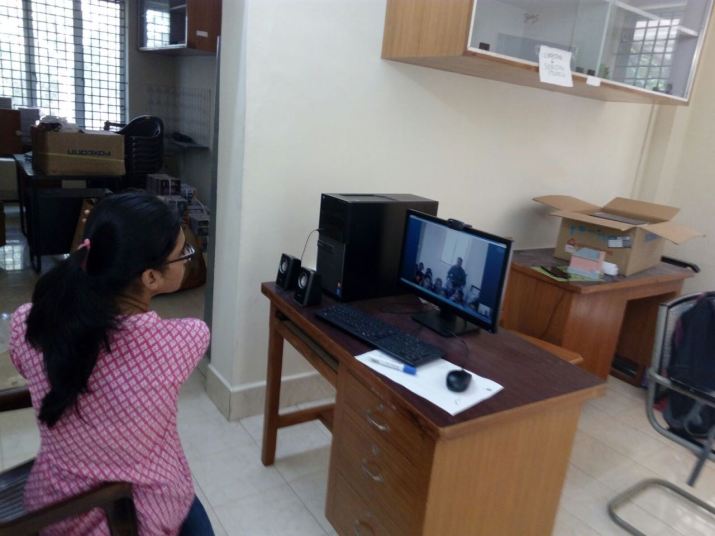IIT for Villages is a student-run organisation that functions as an action platform and a discussion forum through which volunteers engage with villages in and around Tamil Nadu and Andhra Pradesh. Over the past few years the group has initiated several projects to empower, educate and work with villagers and underprivileged children. In this article, Meena, a second-year T5E correspondent who has been working with IViL since she was a freshie, introduces IViL, its projects and what makes it unique.
How was IViL initiated? In the first months of 2005, a bunch of B.Tech students doing an elective course on “Modern Science in India” visited the village Natham (50 km away from Chennai) as a part of their assignment. The assignment aimed to find avenues for interaction between institutes like ours and rural India. On realising that a lot could be done to bridge the gap, a student body was built. IViL – IIT for Villages (it went by a different name back then) was started as a completely volunteer-based and passion-driven organisation and has sustained these features over generations. IViL is now a SAC-approved body supported by the Dean (Students) Office.
Praveen Kumar Sayyaparaju (B.Tech Graduate – Batch of 2009), one of the initial and most active members/alumni of IViL shares how the group worked in its initial days. With none of the members having much experience, IViL started as a series of weekly meetings in the library. Each member being excited about a different thing had led to many teams springing into existence. Over many debates and discussions, in the third year, IViL decided as a group to work on one project – the Integrated Knowledge Centre (IKC) in Natham. A pre-existing building in the village was turned into a resource centre where a library was set up, computers were placed and weekly classes by “IViLians” were held for the villagers. Unlike the present crop of IViLians, the alumni had not much to fall back on and thus had to constantly innovate. They wrote letters to every publishing house based out of Chennai to donate books to the library and received a response to their delight – one of the publishers let them hand-pick books for Rs.3000. Before the IKC was inaugurated on the 26th of January, 2009, they had conducted a two-day camp where over 20 IViLians interacted with the villagers and managed to execute a treasure hunt among other things.
Shilpa Menon (Final year, Integrated M.A.) is one of the longest serving volunteers in the current team and has seen it through its changes and drawbacks over the last four years. Having been a part of other organisations and groups on campus, she says that according to her, it is flexibility that sets IViL apart. IViL does not have the rules, hierarchy or incentives found in the other organisations. Each one is free to bring in their ideas and apply them. While this makes IViL dynamic and ensures a lot of freedom, it brings in an equal amount of responsibility. While IViL has faithfully stayed away from hierarchy, it has managed to bring about a structure to take care of operational needs and organisation. She says that this has managed to attract a unique set of students.

“The usual profile of active IViLians tends to be that of students who feel alienated by the achievement-driven spirit on campus. They join IViL for a different kind of experience. Surprisingly, IViL has consistently attracted highly responsible individuals which makes IViL very interesting as a model. This goes to show that when you give people a lot of flexibility, the result is not that it breaks down because nobody cares enough. In fact, the reverse happens” she adds.
Projects
IViL has half a dozen active projects at the moment. The cycle donation project is one of the oldest projects where the volunteers collect used cycles from campus students, repair them and distribute them among kids from villages in and around Chennai who walk over two kilometers to reach their school.
A library was inaugurated on the 12th of August in Bandikavanur, this year, as a part of the library project. Visits are made every month to turn it into a resource centre and conduct activities to keep the library from falling into disuse.
The Komara project is an online teaching project where IViLians take online classes for students from Komara, Andhra Pradesh to supplement their school work. The team will be making a visit to the village this winter to work on the field.

Kottur Gypsy colony project is the other teaching project under IViL which involves volunteers visiting a colony in Kotturpuram where people from the tribal Narikuravar community live. The community sustains through rag-picking and the children are often more interested in earning money through that than getting an education. With dedicated volunteers, this team is working towards motivating the children to learn while surviving a good beating from the children every week. (Being hit and climbed upon by the students is a staple of the IViL teaching projects)
The Agriculture project works on bridging the gap between farmers and experts. Soil-testing experiments, events in Saarang and Shastra, online counselling sessions with farmers and a magazine for farmers are some of the initiatives under this project which has a seen a vibrant team of volunteers.
The Ignited Minds Conference is a conference planned for urban school students to discuss socially relevant issues and get exposed to rural realities. The pre-conference event, a lecture by Lok Satta party president Dr. Jayaprakash Narayan, was held this September.
Every year during Saarang and Shastra, IViL puts up food stalls where village women cook and we serve. Being one of IViL’s longest running and most successful initiatives, this is aimed at giving the women confidence in income-generation.
Apart from these, a project to teach the children of mess-workers is on the pipeline. At any point of time, teaching or guiding individual students out of the ambit of these projects is also underway.
Fourteen months ago, as an expectant freshie looking for some purpose in campus life, I joined IViL. Plagued by the bureaucracy and incentivised competition around me, I jumped at the opportunity to meet Mr. R. Elangovan, a chemical engineer who had turned his village, Kuthambakkam, into a model village. He had come as part of the IViL Orientation and his lecture was followed by a series of presentations on projects. Although I had not found any of them spectacular, I found myself consistently attending the weekly meetings and learning from other volunteers who were actually doing things. I then started visiting villages and volunteered at the food stalls set up during Saarang and Shaastra. From my initial plan of working four hours every day, I went on to work full-time at the stalls and return to my room to sleep at night. Those five days turned out to be the best of my month-long holidays and not once did I regret missing out on my first Saarang experience.
The brief five-day experience kept me engaged with IViL through the rest of the semester and I slowly began understanding the nuances of working with villages. Attitudinal errors, trust issues, questions of efficiency, scheduling difficulties and the need for persistence are some of the realities encountered by IViL and in this regard, I have learnt more from other volunteers than from my own experience. Engaging more closely with the group in my second year, I have realised that nothing needs to be spectacular. Praveen, who is now imparting science education in government schools around Mysore as a part of the NGO SVYM, recounted an incident where it was brought up that being IITians, we should be doing more than donating cycles and setting up food stalls. He agrees that we should be more resourceful. However, IViL with many projects under its wings – some completed, some ongoing and some dropped – has led to the important learning that one cannot change things over a week. Change takes time and may not always happen. However, between hope and disillusionment, every IViLian realises that learning is a two-way process.
Note: Anyone interested to join IViL can drop a mail at [email protected].


